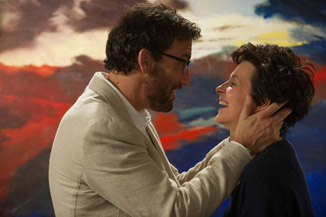The 400-Word Review: Words and Pictures
By Sean Collier
June 16, 2014
BoxOfficeProphets.com

That reading grants far too much depth, though, to a film that can’t balance its artistic ideals and pedestrian concerns. Words and Pictures talks an awful lot about the power of art, but it only wields that power in the name of getting boy and girl together.
Marcus, a rarely-published poet with a grown son and an ever-present glass of vodka, is losing interest in his tech-addicted upperclassmen at a top-tier New England prep school. Meanwhile, Delsanto hasn’t sold anything since rheumatoid arthritis restricted her ability to paint, and is reluctantly taking a teaching gig. He’s the bad boy, she’s the stuffy idealist, and this story has way more in common with the dreadful Cameron Diaz flick Bad Teacher than it should.
A number of vaguely amusing scenes emerge as friendly rivalry between the disciplines engages the two teachers, even if the musings on writing and creating they offer feel hollow. Writer Gerald Di Pego, who’s responsible for a number of scripts ranging from the trite (Message in a Bottle) to the forgettable (The Forgotten, appropriately), repeats himself incessantly; when he’s not hitting middle-age romance notes oft seen on the Lifetime network, he’s quoting from an overplayed list of great works and speeches.
As Words and Pictures dips into darkness, though, it finds some depth. Marcus’s struggle with alcoholism, and the effect it has on those close to him, would’ve provided the meat for a better film. The contrast between his disease and Delsanto’s is worth further exploration, if Di Pego had only had the gumption to do away with some of the hackier and more indulgent scenes. A timely subplot about harassment and bullying among the students is similarly promising and equally underplayed.
The leads keep the train moving, if slowly, as Owen has a knack for grizzled, struggling characters, while Binoche is a welcome presence in a romance of any stripe. In better hands, this combination could’ve led to something memorable. Here, it’s just a bunch of words and ... you know what, never mind.
My Rating: 5/10
Score on CriticsChoice.com: 72/100
Sean Collier is the Associate Editor of Pittsburgh Magazine and a member of the Broadcast Film Critics Association. Read more from Sean at pittsburghmagazine.com/afterdark